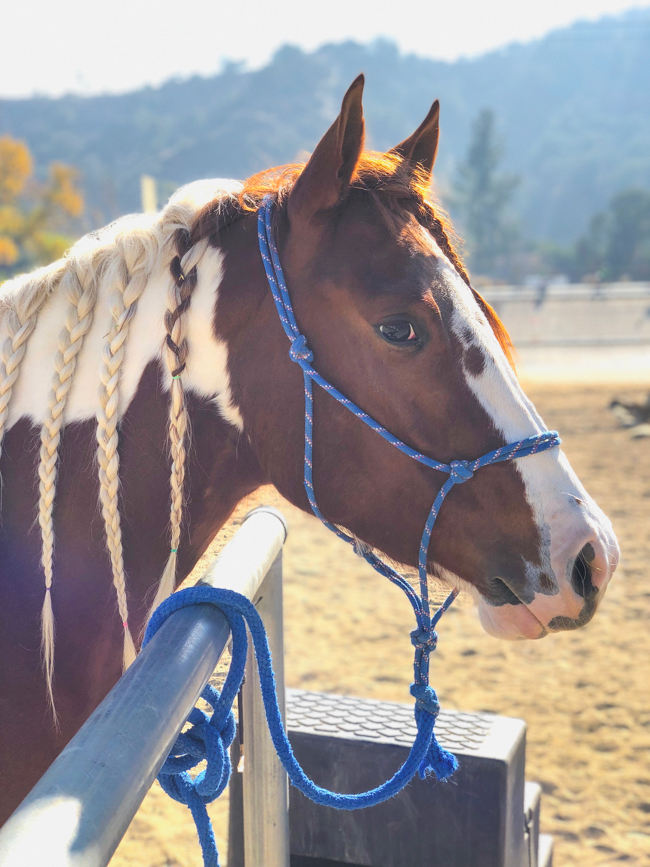A story about ticks and a $500 vet bill.
The Tick Discovery
Last December I was saddling up Fira and getting ready to take her for a ride. I gently put on her headstall and began rubbing her ears before we walked out of the stall. My fingers accidentally slipped down inside her ear canal and I touched some bumps inside. Immediately, I reached in again without looking. I rubbed my fingers around and felt even more bumps. I started to panic thinking it maybe she had cancer and these were the start of tiny tumors. It’s amazing the horrible thoughts that will creep into your mind if you let them.
I took a breath, stood on my tip toes and began looking down inside the ear. Fira’s ears were unclipped so I had to look past the fuzz. There were lumps of all sizes… maybe 50 or more. I reached in again to see if I could pick off one of these bumps. Much to my horror, I was able to pull out a lump, it was a living being – a tick! I felt like crawling out of my skin, my poor horse’s ears were infested with ticks. I walked over to her right ear and saw it was also loaded with ticks. It was a Sunday night, so I left a voicemail with my vet explaining my disgusting discovery. 
The Vet Visit
My vet called me back the next morning, and we talked about options. If Fira happened to have a few ticks, it would have been okay to try and pull them out myself. However there were at least 50 ticks per ear. There was no way she was going to stand calmly while we plucked out these blood suckers, one by one. A sedative might work, however he explained usually the horse begins to fight halfway through sedation and then it’s time to try anesthesia. In order to save time and money for both of us, he suggest we go with the anesthesia right away. Fira would be put under and they would work as fast as possible to remove the ticks.
The day of the appointment, everything went smoothly. My vet arrived with his assistant and a second vet for backup help. They put Fira under and began to work one ear at a time. They pulled 60-100 ticks out of each ear! Her poor ears raw inside from removing the ticks.

An Expensive Lesson
The visit and procedure cost $500. After the removal, Fira had a dose of ivermectin every 10 days. I periodically look inside the ears and we’ve been in the clear. I learned a lot with this experience, which is why I’m sharing it with you. I’ve heard of ticks occasionally getting on horses legs or stomachs and biting them, especially on the East Coast, but I didn’t know that an infestation like this could happen. According to my vet since Fira is from Texas, she most likely picked up the ticks in the pasture out there. They made their way into her ear canal and multiplied. She probably had them in her ear for a year or more based on the amount. I encourage you to check inside of your horse’s ears regularly, especially if they are on pasture a lot. Use a flash light to check deep inside or gently run your fingers along the ear. Lyme disease is another worrisome problem that comes along with being bit, but thankfully Fira is fine.
Since the removal, I’ve noticed subtle signs that my horse is happier without her uninvited guests. She use to lick her metal stall door, I thought it was a boredom problem. However I read metal licking was a sign of an iron deficiency. Ever since the ticks were removed, Fira has stopped licking metal. She’s definitely a happier and healthier horse now.
Have you ever experienced a tick problem with your horse before?




Tracy says
Oh. My. God. I honestly think I would have fainted — I HATE HATE HATE ticks. I had no idea something like this could even happen! I’m so glad Fira is okay and Lyme-free <3
Raquel says
It was so gross! I lost my appetite that night and could not eat dinner, I felt so bad for the poor girl!
Susan Friedland-Smith (Saddle Seeks Horse) says
That is just the craziest thing. I don’t check Knight’s ears often enough. I’m so glad you caught it when you did and that your vet had a plan to make her feel better again. Also, I had not heard of the metal licking before. That’s a good fact for all horse folks to know.
Raquel says
I didn’t know they could just live in a horse’s ears like that. My vet said he has heard about this, but only experienced it one other time in California. With our location (and lack of pastures) this shouldn’t happen again. But it’s always good to know.
Ken Lightburn says
Hi Raquel
If I send you a free gallon of our wonderful organic virgin coconut oil which is used for show horses will you try it on a tick if you find it? I believe it may suffocate them as it does with some skin beasties.
Ken Lightburn
Heather Wallace, Bridle & Bone says
Oh no! We have a huge tick problem here in the northeast, but I’ve never seen that! I make a sell a natural tick repellent through my company, Bridle & Bone Wellness, if you are ever interested. Not a shameless plug, just want to help. The first step is keeping them far far away!
Raquel says
Thanks Heather, feel free to leave a link to your tick repellent in the comments. I’m sure other readers might also be interested too!
Catherine says
FYI – Ear ticks are a different breed from body ticks. They are not the same species. And yes, both are in CA, too, although not necessarily as prevalent as back East. It is easy to treat for ear ticks with .5 cc of Mita-Clear (Pfizer). We do it routinely when each horse is sedated for dentals, as it causes them little discomfort and less agitation for those with ear sensitivity. Glad you got them out, Raquel, as they were really having a family reunion in your poor horse’s ears!
Raquel says
Thanks Catherine. I’ve been doing some reading on them lately and I saw that about ear ticks. I didn’t know that was a specific thing. When my vet comes out this spring for shots, she will likely need to be sedated to have her teeth done. We will take another good look and make sure they are sill in the clear.
Sharon Omalley says
All the above is so helpful! I’ve had ticks in my TB racehorses’ ears. Once you find one, you know to check them all! Xylazine injection for sedation caused many of the ticks to release automatically. I’ve never seen anything like that! Hope this helps others. It’s very unpleasant but must be attended to’
Raquel says
Thanks Sharon. I’m finding tick infestations are becoming more and more common lately. Good to know about the Xylazine injection.
Nicki says
Great reminder and happy Fira is ok!!
Raquel says
Absolutely! Horse ownership certainly keeps us on our toes.
MaVI says
Raquel, thank you ever so for you post.Much thanks again.